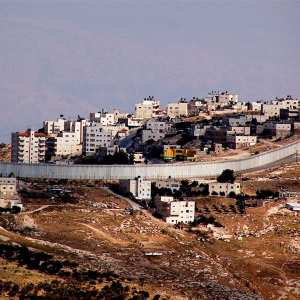
Occupied Thoughts
News & Politics Podcasts
From the Foundation for Middle East Peace (FMEP), Occupied Thoughts amplifies the voices of FMEP grantees and partners, offers critical framing, and promote new ideas and new angles on the many issues connected to achieving justice, security, and peace for Palestinians and Israelis. FMEP works to defend and support Palestinian rights, end Israel’s occupation of the West Bank, Gaza Strip, and East Jerusalem, and ensure a just and secure future for Palestinians and Israelis. FMEP advances this goal through its grants program, public programming, and research. www.fmep.org
Location:
United States
Genres:
News & Politics Podcasts
Description:
From the Foundation for Middle East Peace (FMEP), Occupied Thoughts amplifies the voices of FMEP grantees and partners, offers critical framing, and promote new ideas and new angles on the many issues connected to achieving justice, security, and peace for Palestinians and Israelis. FMEP works to defend and support Palestinian rights, end Israel’s occupation of the West Bank, Gaza Strip, and East Jerusalem, and ensure a just and secure future for Palestinians and Israelis. FMEP advances this goal through its grants program, public programming, and research. www.fmep.org
Twitter:
@FMEP
Language:
English
Contact:
2028353650
Website:
http://fmep.org
Email:
info@fmep.org
Shifts in US Policy & Public Opinion, the Impact of BDS, and Assessing Coming Threats
Duration:00:52:17
From Apartheid to Democracy: A Blueprint for Peace in Israel-Palestine
Duration:01:01:04
Christians in Gaza, Ecclesiocide, and Kairos Palestine II
Duration:00:35:41
Surrealism against fascism - a conversation with Naomi Klein
Duration:00:51:54
Boycott, solidarity & taking responsibility: Ahmed Moor speaks to Peter Beinart about the TAU speech
Duration:00:38:56
Queerness and Liberation: A Discussion about 'Fire in Every Direction' with Tareq Baconi
Duration:01:00:40
Jewish Institutions and Anti-Zionism
Duration:00:57:15
“Without memory, there can be no justice" - Archiving the Gaza Genocide
Duration:00:54:23
Jordan, the Gulf, and American Policy in Palestine
Duration:01:05:54
The Palestine Laboratory, A Conversation with Antony Loewenstein
Duration:01:03:22
The International Solidarity Movement and the Freedom Flotillas
Duration:00:57:54
Media, BDS, and Lessons from 25 Years of Solidarity Work
Duration:00:53:58
Attacks on the First Amendment Continue
Duration:00:39:14
The Starvation Regime and Plausible Deniability for War Crimes
Duration:00:54:11
Accountability After Genocide and the Emerging Left-Right Consensus on Israel in America
Duration:00:54:05
MAGA & the FBI Break Up with the ADL
Duration:00:57:20
On the new 20-Point-Plan, Recognition of Palestinian Statehood, and Popular Pressure to End the Genocide
Duration:00:35:20
UC Berkeley’s Betrayal of Academic Freedom in this Time of Genocide
Duration:00:23:46
FMEP Fellows Peter Beinart & Ahmed Moor on Palestinian statehood & US politics
Duration:00:25:02
Poetry of the Camps: Poems from Gaza on Homeland, Miracles, and Freedom
Duration:00:47:28